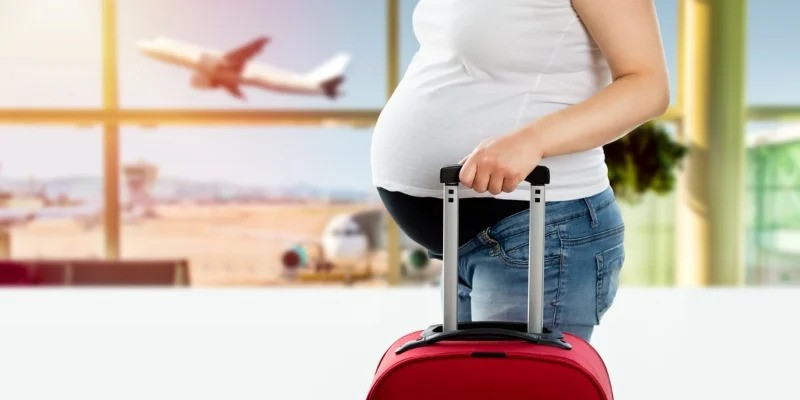E-mail: [email protected]

Pregnancy is the most beautiful journey for a woman in her life. During this journey, she goes through many emotional and physical changes. Many women want to experience new adventures during pregnancy before the baby comes. Travel during this time is not appropriate for all women and may not be safe for you and your baby. Before making a decision, you need to know about pregnancy travel. So, let’s learn about it.
Is travelling safe during pregnancy?
Yes, travelling is safe for most expecting women. However, whether travelling is safe or not depends on many factors, including the stage of pregnancy and the mother’s overall health. Before travelling, you need to consider these factors and consult with your doctor.
Best time to travel during pregnancy
The best time to travel during pregnancy is the second trimester. During this period, you will feel relaxed, comfortable, and secure. You won’t have symptoms of morning sickness or tiredness, and there is a lower chance of miscarriage and preterm labour compared to the first and third trimesters.
First Trimester
In your first trimester (1 week to 13 weeks), you shouldn’t travel if you are dealing with health issues like spotting, cramping, or excessive vomiting. It’s a very sensitive time in pregnancy, with a high chance of miscarriage. However, most women travel during this period if they don’t face any health complications. So, consult with your doctor before travelling.
Second Trimester
The second trimester (14 weeks to 28 weeks) is the best time to travel. If you’re planning to travel before the baby arrives, this is the ideal period. You likely won’t experience nausea or vomiting (morning sickness) and will have more energy. If you don’t have any health issues, you can travel during this period without hesitation.
Third Trimester
In the third trimester (29 weeks to 40 weeks), travel is not as highly recommended as in the second trimester, but you can still travel. There is a higher chance of preterm labor, and travel may become uncomfortable. Some airlines may not permit you to travel without clarification from your doctor due to restrictions on expectant women.
When you can’t travel
If you have these health issues, you shouldn’t travel:
Never take these signs and symptoms lightly; otherwise, you may suffer later. I made the mistake of ignoring these signs, which led to a miscarriage, the most painful experience of my life. If your doctor advises against travelling during this sensitive time (pregnancy), heed their advice.
How to prepare for travel during pregnancy
Consult with your doctor
Before preparing to travel during pregnancy, you need to consult your doctor. Share your plans with the doctor. They will help you make informed decisions and prepare according to your health. If you have any health issues, the doctor can suggest the best course of action.
Choose your destination
Choose your travel destination wisely so that you don’t face any issues there. Ensure that medical facilities, healthy food, and pure water are easily accessible. Avoid places where you might encounter malaria, Zika virus, or other viruses, as these are harmful to you and your baby.
Pack smartly
You must pack wisely. Take your necessary items, prenatal vitamins and medicine, comfortable clothes, snacks, and medical records. This will help you enjoy your journey. Don’t forget to take your important accessories to make your journey perfect.
Ways of travelling during pregnancy
Travel by Bus
Travelling by bus during pregnancy can be comfortable. For long journeys, take a seat that is comfortable, allows easy access to the restroom, and lets you stretch easily. Wear comfortable clothes and carry light luggage.
Travel by Car
Travelling by car is safe during pregnancy. For long journeys, take breaks every two hours to get up, walk, and stretch. This helps make your journey comfortable. Drink plenty of water before and during the journey. Wear your seat belt properly, placing the lap belt under your belly and across your hips, and the shoulder belt between your breasts and to the side of your belly.
Travel by Air
Travelling by air is generally safe, especially during the second trimester. Some airlines don’t permit travel after 36 weeks due to the high chance of going into labor. Airlines have policies related to pregnancy, so check their policies before booking your flight. During the flight, wear comfortable clothes and shoes to prevent discomfort and leg swelling/cramping. Drink enough water to prevent dehydration. Walk and do leg exercises during long flights. Don’t sit for extended periods, as it can be harmful to your baby.
How to make yourself comfortable during travel
To make yourself comfortable during travel, follow these tips:
What you need to notice during travel in pregnancy
While travelling during pregnancy, be aware of these signs and symptoms:
If you experience any of these, immediately contact a healthcare provider. Don’t delay, as it may harm you and your baby. If possible, travel with a partner who can help you if you face any problems.